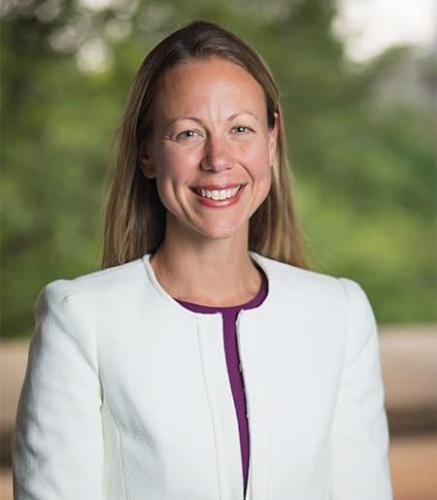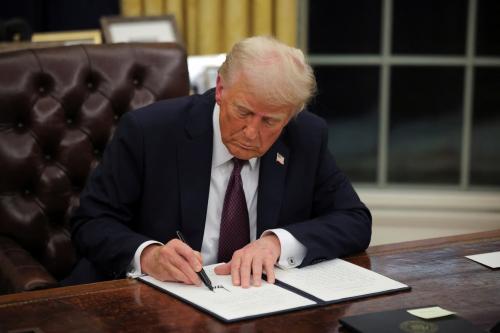This article is part of the “Monitoring the pillars of democracy” series. It focuses on the seven pillars essential to defending democracy, as outlined in the Brookings Democracy Playbook 2025 published by the Anti-Corruption, Democracy, and Security (ACDS) project. The series includes research and commentary on actionable steps democracy actors can take to strengthen democratic institutions and protect freedoms in the U.S. and abroad.
Polling illustrates Americans overwhelmingly understand the value of higher education in equipping students with the skills needed to secure employment in an ever-changing labor market, fulfill personal development, and increase quality of life. Universities and colleges are also essential to the fabric of American democracy, security, and the economy. However, over the past few years, higher education is increasingly viewed with skepticism and now finds itself under attack by the Trump administration.
We have witnessed an unprecedented effort by the new administration, including through recent executive orders, to target, intimidate, investigate, censor, control, and freeze funding to American higher education institutions. These threats to academic freedom follow a familiar pattern, reminiscent of the challenges faced by institutions in autocracies and other countries globally. As highlighted in the Brookings Democracy Playbook 2025, singling out activists and entities among civil society, including universities, is “central to the autocratic playbook.” Our global research demonstrates that targeting individual institutions of higher education often starts with an example to induce compliance but quickly spreads to restrict academic freedom.
In this piece, we highlight the role of universities and colleges in supporting a healthy democracy, threats to higher education in the U.S. and globally, and what democracy actors can do to protect higher education.
Supporting democracy through higher education
Higher education plays a critical role in fostering intellectual humility, critical inquiry, and social responsibility—all of which are necessary for informed democracy actors. Furthermore, American education is a pillar of U.S. global leadership, and academic freedom sharpens the competitive edge. Universities and colleges are leading drivers of scientific research and cultural outputs. They are key in promoting technological, security, and social advancements across the United States. Public universities are often some of the largest employers in states and local communities and contribute engaged research to support local schools, health care, and industry development. American institutions are consistently ranked among the best in the world, attracting students from across the globe.
Nonetheless, American higher education institutions have experienced increasing challenges in recent years. For example, following the George Floyd protests against police brutality, PEN America tracked a “legislative onslaught” of educational gag orders, attempting to limit discussions of racism and sexism in American history in educational settings, including in higher education. The Trump administration is now turbocharging efforts to curb academic freedom and free speech by targeting universities it paints as breeding grounds for elitism, “race-exclusionary practices” in the form of diversity, equity, and inclusion (DEI), and what they frame as extremist ideologies.
Since taking office, the administration has slashed funding at National Institutes of Health (NIH) and other key agencies that support biomedical and other research at universities and other institutions nationwide. Ninety-four public universities have had NIH grants terminated. Freezes or cuts to funding are likely to “set American science back by a generation.” This may result in brain drain, the loss of life saving research, and jeopardize the development of talent and entrepreneurship.
The Trump administration’s executive order to dismantle the Department of Education draws back staffing levels critical to administering students’ financial aid. At the same time, the administration has moved quickly to penalize several universities by withholding funding (possibly illegally), claiming the institutions failed to clamp down on antisemitism following pro-Palestinian protests.
Disturbingly, within weeks, over a thousand international students and faculty have reportedly had their visas revoked, student status terminated, or been detained by Immigration and Customs Enforcement (ICE) on the basis of their thoughts or ideas. Initially, these deportations began with students being targeted for engaging in activism such as publishing an op-ed in a student newspaper, but now include AI scraping of social media for “anti-terrorism” purposes or utilizing traffic violations as the basis for visa revocation. These ongoing crackdowns are reported to have a chilling effect on academic freedom and free expression.
Examining autocratic takeovers of universities in Poland, Turkey, and Mexico
The increasing threats to higher education are reminiscent of the challenges to free speech and academic freedom faced by universities in Poland, Turkey, Mexico, and elsewhere globally.
In Poland, under the former Law and Justice (PiS) government, the main attack on universities was through ideological interference around culture, history, and identity politics. The 2018 Law on Higher Education and Science reform centralized academic governance in Poland, giving more power to university presidents and councils. Opponents said this law opened the door to government efforts to curb academic freedom, exert political influence, and control higher education’s funding and decision-making.
The PiS government and media affiliates also targeted particular areas of study, such as gender studies, sociology, philosophy, history, and other disciplines as being “anti-Polish” and forcing a narrow, partisan idea of Polish nationalism into curricula. Professors were targeted for critique, subjected to lawsuits, and attacked in the media for holding progressive views on abortion or Polish history. PiS also used legal and financial tools to pressure and ideologically reshape education to align academic discourse with national-conservative voices.
President Recep Tayyip Erdoğan’s effort to control universities in Turkey began early in his tenure and ramped up aggressively following the 2016 coup attempt. The Turkish Council of Higher Education forced 1,577 university deans to resign, saying reinstatement would only occur if they were found not to have ties to alleged coup plotters. Erdoğan changed laws and existing bureaucratic agencies to reduce the budgetary and academic autonomy of universities and increased police presence on campuses.
Erdoğan went further by issuing a decree in 2018 that gave him full control over the appointment of university presidents. He has used this power to replace elected university leaders with government-appointed ones, including at the leading public Boğaziçi University in 2021. He has continued to penalize speech that criticizes the government or that does not align with government positions and harass faculties and students.
Lastly, in Mexico, former President Andrés Manuel López Obrador targeted universities, painting them as too conservative or neoliberal and endeavoring to reduce their autonomy to serve his own political interests. Obrador berated public universities, calling them disconnected from the needs of the people, and suggesting they were complicit in the economic model he opposed.
Obrador reduced or froze funding for public research institutions under the banner of austerity and anti-corruption, and restructured the National Council of Science and Technology in ways many criticized as ideologically driven and aimed at marginalizing academic voices not aligned with the government. Some researchers were investigated for criminal charges of alleged misuse of funds. While these charges were not successful, many interpreted them as an intimidation tactic and an attempt to delegitimize institutions and scholars more generally.
Responding to threats
Political challenges are not new to American higher education. The Trump administration’s actions raise this to another level. The administration’s targeting of higher education and threats to academic freedom and free speech are likely to worsen. Some universities have sought to meet the administration’s demands or feign institutional neutrality.
However, resistance, including protests and litigation, is springing up across the country to respond to the ramped-up threats posed to higher education. An effective response will require building a big tent across American universities, colleges, and other democracy actors to safeguard academic freedom and the broad contributions of higher education to society. Many types of higher education institutions are banding together to collectively defend their autonomy, academic freedom, and free exchange of ideas.
We know that institutional neutrality in the face of democratic threats has seldom worked in historical or contemporary contexts. History shows that surrendering to ideological control strips academics of their independence—and when lost, it is hard to regain. Higher education institutions, including university leadership, could stand together and not capitulate to assaults on academic freedom. For example, as Harvard University found itself in the crosshairs of the administration, it took a strong stance to protect academic freedom as well as its broader values and mission.
Cross-sector networks, including public and private universities and community colleges, can work together to bolster higher education’s role in preserving democracy through initiatives such as the Big Ten Democracy Summit. Constructive dialogue courses and events on the future of democracy can also bolster civic education and participation. Higher education institutions can engage beyond campus leadership and administrators to include students, faculty, staff, and communities beyond the university setting, including engaging and cooperating with other targeted sectors and groups. Labor unions and research associations representing faculty, staff, and students can also encourage their institutions of higher education to stand up for their values.
In addition, students, alumni, and citizens across the country can make their voices heard by engaging with elected officials. More elected leaders at the local, state, and national levels could acknowledge the important contributions higher education has made to their lives, communities, and economy and explain the grave ramifications of the administration’s actions.
Higher education institutions are fundamental to American democracy. The civic space and freedoms in the U.S. are under threat, and higher education is no exception. Whether there is a collective response to these attacks will determine if American higher education maintains its excellence or falls victim to the global democratic recession.
-
Acknowledgements and disclosures
The authors would like to thank Julianna Melendez and Finnbarr O’Reilly for fact-checking and copyediting assistance and Robin Lewis and Eric Urby for editorial assistance.
The Brookings Institution is committed to quality, independence, and impact.
We are supported by a diverse array of funders. In line with our values and policies, each Brookings publication represents the sole views of its author(s).








Commentary
Targeting higher education is an essential tool in the autocratic playbook
May 1, 2025